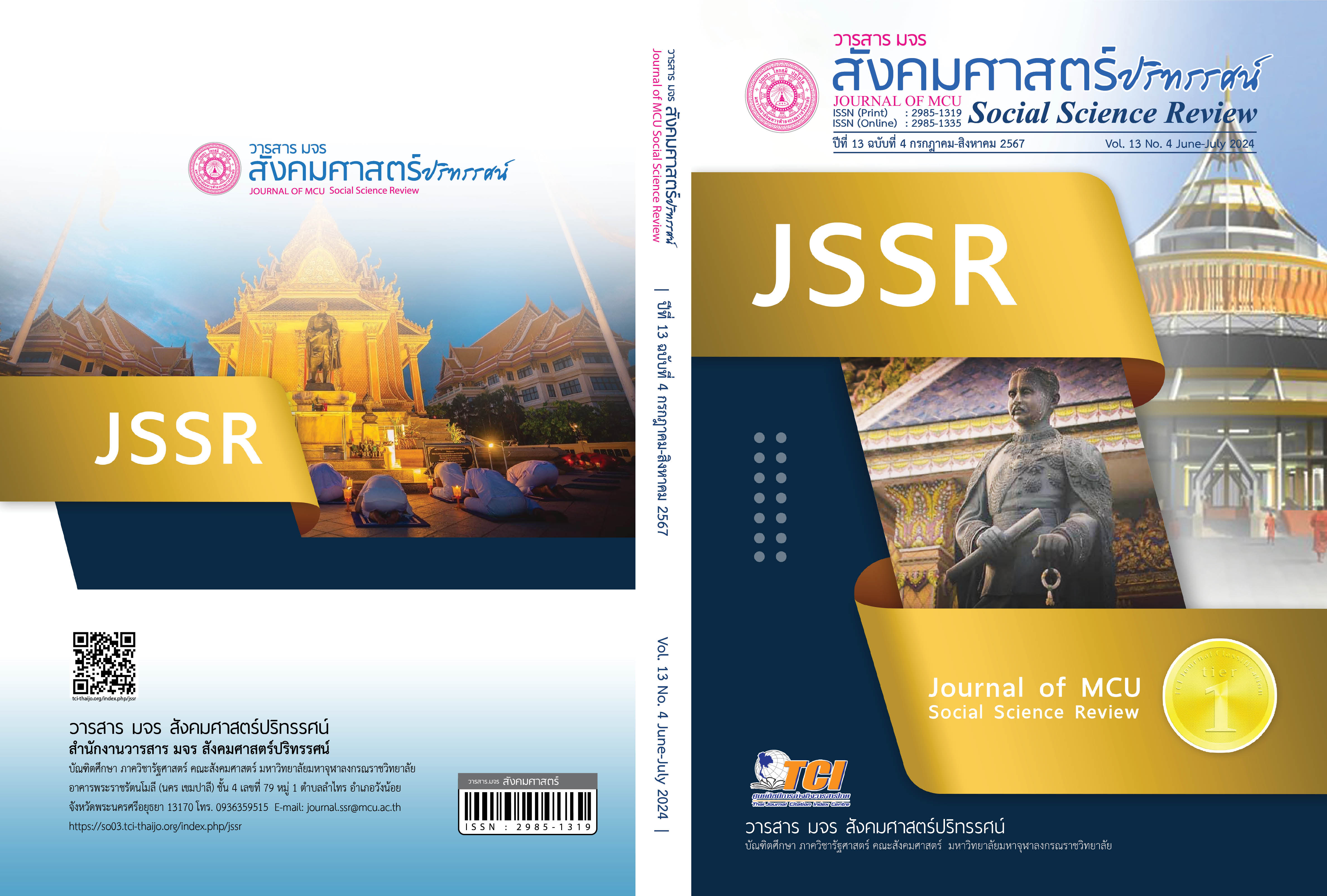วินัยทางการเงิน…เส้นทางเดินของครู สู่การไร้หนี้สิน: กรณีศึกษาข้าราชการครู โรงเรียนบ้านหมอพัฒนานุกูล
คำสำคัญ:
วินัยทางการเงิน, ปัญหาหนี้สินครู, วิธีการแก้ไขปัญหาหนี้สินครูบทคัดย่อ
บทความวิจัยนี้มีวัตถุประสงค์ 1. ศึกษาปัจจัยที่ก่อให้เกิดปัญหาหนี้สินครู 2. ศึกษาวิธีการที่ครูใช้ในการแก้ไขปัญหาหนี้สิน เป็นการวิจัยเชิงคุณภาพแบบปรากฏการณ์วิทยา ผู้ให้ข้อมูลในการศึกษาครั้งนี้เป็นข้าราชการครูโรงเรียนบ้านหมอพัฒนานุกูลที่เป็นหนี้ จำนวน 15 คน เพื่อให้ได้ข้อมูลที่ความหลากหลาย ผู้วิจัยใช้การแบ่งกลุ่มผู้ให้ข้อมูลด้วยหลักประชากรศาสตร์คัดเลือกผู้ให้ข้อมูลหลักแบบเฉพาะเจาะจง ใช้แบบสัมภาษณ์แบบกึ่งโครงสร้างในการสัมภาษณ์เชิงลึกในการเก็บข้อมูล ผลการวิจัยได้มาจากการวิเคราะห์ข้อมูลที่มาจากการถอดความในการสัมภาษณ์ หลังจากนั้นได้ทำการสร้างกรอบประเด็นสำคัญ เพื่อนำไปสร้างข้อสรุปเชิงพรรณนา
ผลการวิจัยพบว่า แม้ว่าผู้ให้ข้อมูลเป็นครูที่มาจากต่างรุ่นกัน แต่ครูโดยส่วนใหญ่ต่างมีเหตุผลส่วนตัวที่คล้ายคลึงกันเกี่ยวกับสาเหตุที่ทำให้ให้ตนเองประสบกับปัญหาหนี้สิน ได้แก่ ด้านความต้องการจำเป็น ด้านค่านิยมทางสังคม และด้านพฤติกรรมส่วนตัว ผู้ให้ข้อมูลใช้แนวทางและวิธีการในการแก้ไขหรือลดปัญหาหนี้สิน ซึ่งสามารถปรับใช้กับครูที่อยู่ในสถานการณ์เดียวกัน คือ การมีวินัยทางการเงิน และการบริหารจัดการสินทรัพย์และหนี้สิน และการน้อมนำปรัชญาของเศรษฐกิจพอเพียงที่พระบาทสมเด็จพระปรมินทรมหาภูมิพลอดุลยเดชทรงพัฒนาขึ้นมาเป็นหลักในการดำเนินชีวิต
เอกสารอ้างอิง
กาญจนา บุญส่ง. (2563). ภาวะหนี้สินของข้าราชการครูในจังหวัดเพชรบุรี. วารสารวิชาการมหาวิทยาลัยราชภัฏเพชรบุรี, 10(1), 31-37.
ทฤฒมน ชี้กิ่ง. (2563). ปัจจัยที่มีผลต่อพฤติกรรมการมีวินัยทางการเงินของข้าราชการกองบัญชาการกองทัพไทย. วารสารการจัดการสมัยใหม่, 18(1), 72-87.
ธนาคารแห่งประเทศไทย. (2565). ธนาคารแห่งประเทศไทยกับการแก้ไขปัญหาหนี้สินครัวเรือน. สืบค้น 14 พฤศจิกายน 2565, จาก https://shorturl.asia/RwAxI
เบญจวรรณ บุญคลี่. (2552). ปัจจัยที่มีผลต่อพฤติกรรมการมีวินัยทางการเงินของครู : ศึกษากรณีครูในเขตพื้นที่การศึกษานครปฐม เขต 2 (ภาคนิพนธ์ศิลปะศาสตรมหาบัณฑิต สาขาวิชาการพัฒนาสังคม). กรุงเทพฯ: สถาบันบัณฑิตพัฒนบริหารศาสตร์.
ปรีชา วิยาภรณ์. (2559). กระบวนการแก้ไขปัญหาหนี้สินของข้าราชการครูและบุคลากรทางการ ศึกษา (วิทยานิพนธ์ดุษฎีบัณฑิต สาขาวิชาการบริหารการศึกษา). กรุงเทพฯ: มหาวิทยาลัยศิลปากร.
มนต์ทนา คงแก้ว. (2561). รายงานสถานการณ์หนี้สินครัวเรือนกับแนวการสร้างวินัยทางการเงินเพื่อความพอเพียง. นครศรีธรรมราช: มหาวิทยาลัยเทคโนโลยีราชมงคลศรีวิชัย.
วิชญา ยถาภูธานนท์. (2560). วินัยทางการเงิน สร้างได้จริงหรือ. สืบค้น 14 พฤศจิกายน 2565, จาก https://shorturl.asia/WJcOG
สุชาดา นันทะไชย. (2564). ค่านิยมความพอเพียง : ค่านิยมร่วมที่ต้องเร่งสร้างในองค์กรสถานศึกษา. วารสารวิชาการผลประโยชน์แห่งชาติ. 1(2), 69-76.
สุอนงค์ บัวทอง. (2563). แนวทางการบริหารจัดการแก้ปัญหาหนี้สินของครูในจังหวัดเพชรบุรี. วารสารบัณฑิตศึกษา มหาวิทยาลัยราชภัฏสวนสุนันทา, 13(1), 18-28.
Gianakos, A. L. et al. (2023). The Case for Needed Financial Literacy Curriculum During Resident Education. Journal of Surgical Education, 80(4), 597-612.
ดาวน์โหลด
เผยแพร่แล้ว
รูปแบบการอ้างอิง
ฉบับ
ประเภทบทความ
สัญญาอนุญาต
ลิขสิทธิ์ (c) 2024 วารสาร มจร สังคมศาสตร์ปริทรรศน์

อนุญาตภายใต้เงื่อนไข Creative Commons Attribution-NonCommercial-NoDerivatives 4.0 International License.
เพื่อให้เป็นไปตามกฎหมายลิขสิทธิ์ ผู้นิพนธ์ทุกท่านต้องลงลายมือชื่อในแบบฟอร์มใบมอบลิขสิทธิ์บทความให้แก่วารสารฯ พร้อมกับบทความต้นฉบับที่ได้แก้ไขครั้งสุดท้าย นอกจากนี้ ผู้นิพนธ์ทุกท่านต้องยืนยันว่าบทความต้นฉบับที่ส่งมาตีพิมพ์นั้น ได้ส่งมาตีพิมพ์เฉพาะในวารสาร มจร สังคมศาสตร์ปริทรรศน์ เพียงแห่งเดียวเท่านั้น หากมีการใช้ภาพหรือตารางหรือเนื้อหาอื่นๆ ของผู้นิพนธ์อื่นที่ปรากฏในสิ่งตีพิมพ์อื่นมาแล้ว ผู้นิพนธ์ต้องขออนุญาตเจ้าของลิขสิทธิ์ก่อน พร้อมทั้งแสดงหนังสือที่ได้รับการยินยอมต่อบรรณาธิการ ก่อนที่บทความจะได้รับการตีพิมพ์ หากไม่เป็นไปตามข้อกำหนดเบื้องต้น ทางวารสารจะถอดบทความของท่านออกโดยไม่มีข้อยกเว้นใดๆ ทั้งสิ้น





